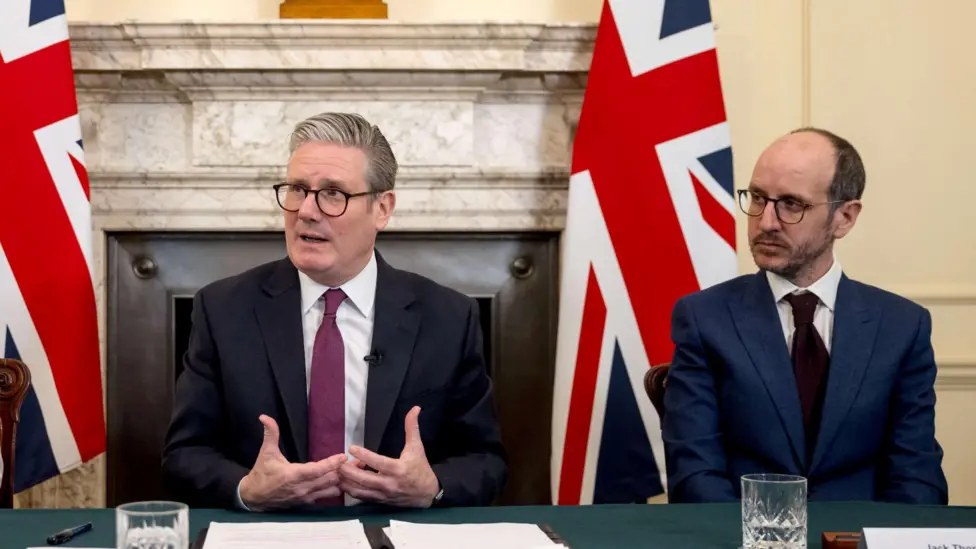“As a father, watching Adolescence with my teenage son and daughter hit home hard. We all need to be having these conversations more. I’ve backed Netflix’s plan to show the series for free in schools across the country, so as many young people as possible can see it.”
Keir Starmer, on X, March 31st
There is so much that infuriates me about this tweet that I struggle to know where to start. But before I launch into my take from the standpoint of an ex-schoolteacher, let me speak simply as a voter. Where have all the statesmen gone? How do we find our country led by someone so easily swayed by the public response to a work of fiction, aired on a popular streaming channel? I suppose in the same way as we ended up with a leader who is currently overseeing the most significant change in UK human rights law for decades, simply because – and I quote – he “made a promise to Esther Rantzen.” The Prime Minister of the United Kingdom is governing according to what celebrities want him to do and according to the public hand-wringing about a Netflix drama. We truly are through the looking glass.
I have always had my frustrations with our robotic PM, merely the latest in a long line of identikit ministers, who appear to have no idea what they believe in or what they stand for, but my frustration with Starmer’s comments this week stem from the consistent way in which schools are now held accountable for every ill in society. Rising knife crime? Get schools to deal with it. Burgeoning antisemitism? Get schools to address it. Just this morning, Education Secretary Bridget Phillipson called for “more male teachers, so British boys have role models.” This call comes, despite the fact that we have zero evidence that increasing the number of men working in a school has any net positive effect on the boys in their care. Anecdotally, I am happy to report the blindingly obvious observation that for every boy inspired and managed by the 6ft 7 PE teacher with the booming voice (and believe me, I have gone to such men for help when managing a certain kind of boy), there are likewise just as many boys who will relate to and be inspired by me, by their flamboyant male drama teacher, or their zany female art teacher. I wouldn’t have thought, in 2025, that one needs to point out that there is more than one type of boy.
“Schools can’t solve these problems alone, and responsibility starts at home with parents. But only one in four of the teachers in our schools are men. Just one in seven in nursery and primary. One in 33 in early years,” says our illustrious Ed Sec. See just how much heavy lifting the “but” is doing in that quote? Schools can’t do everything, BUT … let’s focus on them anyway. This is how education gets treated by the government – we are the punching bag for society’s frustrations and we must solve all its ills. The drama Adolescence raised questions about parenting, as well as the potential role played by the influences of social media in young people’s lives, but governments don’t want to talk about these things. It is an obvious fact that more of their voters are parents than teachers, so it’s much easier to blame the latter than the former for society’s problems. As for social media and the internet in general, the government has absolutely no idea what to do and they certainly don’t want to do the most obvious thing, which is to challenge individuals to take more responsibility for what their own children find themselves exposed to. What they may do, which is take the opportunity to bring in more laws to curb free speech online, I can’t even bear to think about.
No, let’s say the schools have to tackle it all. Let’s argue about whether or not phones should be banned in schools, rather than discuss the fact that it is the children’s parents who fund the very existence of these devices in the first place. Schools are not responsible for the fact that many – perhaps even most – children have unfettered access to the internet. That responsibility lies with the adults that purchase the device, hand it to their kids and pay the bill for its extensive usage. Schools have had this problem dumped upon them and trust me, they feel the fall-out. You wouldn’t believe how much time is wasted in schools while pastoral leaders investigate cases of bullying, harassment, sexting, indecent images and incitement to violence that take place through these children’s mobile devices on a daily basis. One of my earliest shows for Teachers’ Talk Radio explored the relationship that teenagers have with their smart phones: I interviewed Matt Crowley, lead DSL (Designated Safeguarding Lead) in the school in which I was working at the time. He talked about the serious safeguarding risks and the systemic damage to a child’s mental health, self-esteem and personal safety which can arise from the use of these devices – in school and beyond. None of this is news to teachers; we’ve been saying it for years.
To return to Starmer’s tweet, let’s focus on the absolutely ridiculous proposal that Adolescence, a Netflix drama, should be “shown in schools”. Unsurprisingly, the writers and producers of the show are delighted by all the fuss. I bet they can’t believe their luck. There are influential talk-show hosts out there, not only recommending the show, but berating politicians who have not watched it as “ignorant”, “uncaring” and “out of touch”. Apparently, it’s compulsory viewing and if you haven’t viewed it, you’re an officially Bad Person. But let’s actually think about the idea that this drama should be “shown in schools”, shall we? Firstly, shown to whom? The drama is rated 15, so schools would not be able to show it to any year group below Year 11, since some students in Year 10 will not turn 15 until after the end of the academic year. If Starmer thinks the drama is so significant and truly reflective of reality (he has twice accidentally referred to it as “a documentary”, which is actually terrifying), I would point out that the perpetrator of the crime in the drama is thirteen years old. Showing the drama to 16–18-year-olds would thus seem to be missing the point.
Furthermore, and this applies to the equally insane directive that schools are now somehow responsible for teaching children how to brush their teeth, what would Starmer like schools to remove from the curriculum in order to make time for this four-hour TV marathon? One assumes that he doesn’t want them taken out of maths, English and science, so perhaps he sees it as fitting within the PSHE programme. Does he know that most schools barely manage the advised one hour per week? That they seriously struggle to fit this in? What would he like us to remove from the curriculum in order to make way for a drama that at least half of the kids will already have seen at home? Sex education and consent? I would have thought that was pretty important to cover, given the content of the drama. Alcohol, smoking and illegal drugs? How about college applications and how to present yourself at interview? Financial literacy? Martin Lewis won’t be happy, and given Starmer’s terror of celebrities that will mean some more sleepless nights for him. What a dilemma, Keir! Isn’t leadership difficult?!
I struggle to respect a leader who is so beleaguered by the ebb and sway of public opinion and general feelz. This is a Prime Minister who has somehow found time in what one would have assumed is a busy week to meet with the writer and the producer of the Netflix drama to discuss it. I mean … what?! I would rather he got on with the business of government. If the man stands for anything then he needs to convince me that he cannot be pushed around by celebrities and current talking points. But it seems we have somehow grown so used to weak leadership that now we take it for granted.

